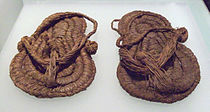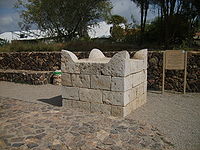 In Luke 6:17-26 we have the blessings and woes. Much has been said about the blessings, also known as the beatitudes, but let's look at the last one of those and the last one of the woes. "Blessed are you when men hate you, when they exclude you and insult you and reject your name as evil, because of the Son of Man. Rejoice in that day and leap for joy, because great is your reward in heaven. For that is how their fathers treated the prophets" (Luke 6:22-23), and "Woe to you when all men speak well of you, for that is how their fathers treated the false prophets" (Luke 6:26). Jesus is not speaking of the accolades that come with hard work and success in life which can be richly deserved. A person isn't awarded a Nobel prize without great accomplishment. Whoever wins a medal at the Olympics has worked long and hard and given up all other pursuits. That type of acclaim is not the subject of the blessings and woes in Luke 6. No, Jesus is saying, "Woe to you who are yes men to kings and presidents, who lead people away from God rather than toward God." He is saying, "Blessed are you who truly speak the word of God." If we speak the word of God, we may well put ourselves in danger and suffer for it. For an example, we need only look back to our discussion of Elijah speaking God's word to King Ahab. Elijah had to go into hiding and be fed by ravens while the false prophets of Baal were feted at the King's court. Elijah spent years living with the widow while Ahab actively hunted him in order to kill him. But God kept Elijah safe. Elijah didn't feel blessed at the time, nor did he rejoice, but I'm sure his reward in heaven was great. For Reflection: Have I ever had to stand up for what was right? If so, how did I do? Let us pray. Jesus, I admit it's not easy to stand up publicly for your word and for what is right in your eyes. Still, I trust that when I do you will be with me and will give me the words to say. Help me to rejoice in insult and rejection on your behalf.
0 Comments
 With regard to the prophets, such as Elijah whom we've been reading about, I'm not sure how far in advance God spoke to them about what he wanted them to do. For example, we don't see, "God said to him, 'Next month I want you to go to the desert.'" It always appears to be immediate instructions that are given. Sometimes there are long periods when the prophet is not speaking for God. Elijah waited during the 3 years of the drought before God told him to go back and speak to King Ahab again. What did he do during those 3 years? We could assume he did whatever type of work he was doing before God called him to speak to Ahab. Although he fled his home and went to Zarephath, perhaps he had a skill or trade that could be practiced anywhere. But even if he was able to practice his trade in Zarephath, he had left his home and his family behind. Nor do we know how old he was. Was he about the same age as Ahab? Older? Younger? What we do know about Elijah is that he had a relationship with God; he listened to God; he waited on God; he was devoted to God. When God spoke, Elijah listened. For Reflection: Where am I? Do I have a relationship with God? Do I listen to God? Do I wait on God? Am I devoted to God? If God called me to drop everything and do something for him, would I do it? Let us pray. God, I tell people you are the most important person in my life, but I see now that may true. I'm not sure that I could drop everything to follow your instructions. How do I build my trust in you to the point where I could do that?  For the most part the time of the Kings of Israel was not an illustrious one. With a few exceptions they served false gods and were wicked men. God sent prophets to them, but they didn't listen. The entire people suffered because of the kings. The Psalmist says, "Today, if you hear his voice, do not harden your hearts" (Psalm 95:7-8). Yes, the kings of Israel hardened their hearts, but God continued to send prophets. God never gives up on us. He still speaks today. Let us pray for leaders around the world to be men and women with soft hearts and open ears who listen to God. Let us pray the same thing for ourselves and our families.  We touched briefly in the last couple of weeks on God sending Elijah into hiding while he waited on Ahab to change his mind (1 Kings 17:3-4, 8-9, 18:22, 19:10). During that time, three years, Elijah felt very much alone. Although Elijah was isolated from the other believers, there were others who were faithful. There were Obadiah and the 100 prophets he hid in caves. And in 1 Kings 19:18 God tells Elijah that there are 7000 more who have not worshiped the false gods. There is another reference to Elijah. This time it is from the lips of Jesus. In Luke 4:25-26, Jesus says that Elijah was not accepted by his own people, but was sent instead to a non-Jew, the widow in Zarephath. Jesus' implication is that the Jews of Nazareth are just as unaccepting of him, a native son, as the Jews of the northern kingdom of Israel were of Elijah. And so the prophet, whether Elijah or Jesus, is sent to a person or people who are more open to the word of God. For Reflection: Being sent to speak to other people, to do the work of God, may cause us to be alone or to feel alone. But in the power of the Spirit we can draw on the strength of God, on the strength of those worshiping in heaven and on the strength of the faithful on earth. Let us pray with those in heaven: "Holy, holy holy is the Lord God Almighty, who was, and is, and is to come. . . . You are worthy, our Lord and God to receive glory and honor and power, for you created all things, and by your will they were created and have their being" (Revelation 4:8, 11).  Let's rejoin Elijah in his triumph on Mt. Carmel. Elijah prays. God sets fire to the sacrifice and the people are convinced once again that the Lord is God (1 Kings 18:30). Ahab and his false prophets are defeated. In fact, Elijah has the false prophets put to death. When King Ahab reports to his wife Jezebel what happened on Carmel, she is none too happy. In fact, she threatens Elijah. By the same time tomorrow she intends to see him dead. Elijah, fresh off the high of God's success on Carmel, and just having seen the 3 year drought ended (1 Kings 18:41-46), is so afraid of Jezebel's threat that he runs away and hides in the desert. For Reflection: Elijah was a man of God, but still a man. He was subject to highs and lows, triumphs and defeats. We can ask ourselves why, when he had just seen how powerfully God worked, was he afraid of Jezebel. But the real question is, would I do any better? When I know God's power, why am I afraid? Let us pray. God, it seems we all doubt you at some point in our lives, even when we know better. It must be frustrating for you. I'm sorry that I doubt you, sometimes on a daily basis. Lord, I believe. Help me to overcome my fear and unbelief (see Mark 9:24).  It's showdown time at Mount Carmel. Ahab and Elijah meet and Elijah throws down a challenge. King Ahab is to gather the 450 prophets of Baal that he has been taking care of and Jezebel is to present her 400 prophets of Asherah (nature and fertility gods) to stand in a test against Elijah, prophet of the Lord. Elijah tries to whip up enthusiasm and faith among the people of Israel, but not even he can succeed at that. They want to wait and see who wins the challenge. The challenge (as issued by Elijah): "Get two bulls for us. Let them choose one for themselves, and let them cut it into pieces and put it on the wood but not set fire to it. I will prepare the other bull and put it on the wood but not set fire to it. Then you call on the name of your god, and I will call on the name of the Lord. The god who answers by fire - he is God" (1 Kings 18:23-24). The outcome: The false prophets prayed from morning until noon. Nothing. They prayed from noon until evening. Nothing. Elijah prepared the altar of the Lord. He had the wood soaked in water until a trench around the altar was also full of water. Elijah prayed once. "Then the fire of the Lord fell and burned up the sacrifice, the wood, the stones of the altar and the soil, and also licked up the water in the trench" (1 Kings 18:38). For reflection: Elijah let the other prophets have first choice of the bulls to be offered. The bull was one of the symbols of Baal representing lust for power and sexual pleasure. Those are still powerful gods today. Am I dedicated only to the one true God or are there others in my life? Let us pray. You alone are holy. You alone are the Lord. You alone, Jesus Christ, are the most high.  People are strange; prophets are stranger. Evidently Elijah was known for disappearing. When Elijah instructs Obadiah to go tell King Ahab that he is there, Obadiah objects. He's afraid that when he brings Ahab, Elijah won't be there: "I don't know where the Spirit of the Lord may carry you when I leave you" (1 Kings 18:12). There is a similar fear expressed in 2 Kings 2:16, "Perhaps the Spirit of the Lord has picked him up and set him down on some mountain or in some valley." So it must not have been unusual for God to transport Elijah somewhere else. This time, though, Elijah assures Obadiah that he will be there when he returns with Ahab. For Reflection: Isn't it interesting that the King comes to see Elijah the prophet rather than Elijah going to the King? What does this signify? Let us pray. O Lord, you have searched me and your know me. You hem me in - behind and before; you have laid your hand upon me. Where can I go from your Spirit?" (Psalm 139:1, 5, 7)  The other thing happening while Elijah was waiting oj God is that Obadiah was doing his best to save at least some of God's prophets. He managed to save 100 prophets, 50 each in two caves. That also meant he was secretly getting food and water to them so that King Ahab and Queen Jezebel would not find out. It was a big risk for him (1 Kings 18:1-6). So while Elijah is hiding in exile, no doubt wondering what God is doing back in Israel, God is using Obadiah, a man in the King's inner circle. God's plan did not depend entirely on Elijah; he had other people in place. For Reflection: We may not see or know God's full plan. We may think that everything depends on us. But God has billions of people around the world who are devoted to him and available to carry out his plans. We need never feel alone in serving God whether we see others with us or not. St. Paul offers this encouragement in Hebrews 12: We are surrounded by a great cloud of witnesses (those who have gone before us in the faith). Let us throw off everything that hinders us and run the race marked out for us. Let us fix our eyes on Jesus. Let us pray. Jesus, I realize I am not privy to your entire plan. I know I'm just a small part of it. Help me to keep my eyes fixed on you while I run the race you have marked out for me.  Three years pass for Elijah in Zarephath. While Elijah was hiding out in the home of the widow, King Ahab mounted a search to find this prophet who had cursed him with drought. In all the surrounding nations no one knew where he was. Meanwhile the drought continued and the famine worsened. Queen Jezebel's response was to kill all the prophets of God that she could find. King Ahab and his top adviser (and faithful servant of God) Obadiah were trying to save the country from disaster. They went out one day looking for any remaining grassland on which to pasture the animals. Ahab and Obadiah had gone in different directions when Elijah walked up to Obadiah, who recognized him, and said, "Tell the King that Elijah is here" (1 Kings 18:1-8). For Reflection: Sometimes the plans of God don't work quickly. While God waited three years for Ahab, King of Israel, to repent, Elijah cooled his heals in modern-day Lebanon. This time of resistance to God was not a fun time for anyone. Ahab and Obadiah had to deal with the drought; Elijah had to leave his country; most of the prophets of God were killed. Where I am today? Am I in the "waiting on God to work out his plans" stage? Or am I in the action stage of speaking to people who need to hear God's word? Is it possible to be in both stages at once? Let us pray. Only you know, Lord, only you know the times of my life, the ups and the downs. Don't let my heart be stubborn like that of Ahab or Jezebel. Help me to stay true to you like Elijah and Obadiah in times of waiting and times of action.  God has now worked two miracles regarding food for Elijah. First, he fed him through ravens in the wilderness. Second, he fed him through the widow of Zarephath. The third miracle related to Elijah, so far, is that God has withheld rain from Israel in order to prove to King Ahab that he is the one, true God. Elijah is biding his time, waiting for the next call from God, when the son of the widow becomes ill and stops breathing. The woman immediately blames this on Elijah. Why not? By now she knows that not only is he a foreigner but also an enemy of the King of Israel. Surely her housing of this man has brought this evil upon her (1 Kings 17:17-18). Elijah ignores the accusation and God uses Elijah to raise the boy back to life. This saving act, more than anything else, convinces the woman that Elijah's God is the true God and she has done the right thing by taking him in. "Now I know that you are a man of God and that the word of the Lord from your mouth is the truth" (1 Kings 17:24), is her confession of faith. The multiplication of food had not convinced her, but bringing her son back to life has. For Reflection: How many miracles does it take to convince me that God is at work? Let us pray. Lord, I can be so hard-headed and disbelieving sometimes. Help me to recognize you in my life every day. |
AliceI started this website and blog on May 1, 2012. I am a Catholic who has been in ministry for many years. I first developed what I would call a close relationship with Jesus in the early 1970s. Ever since then I have been praying with people for healing and other needs. It is because I have seen so many of these prayers answered that I am so bold as to offer to pray for you individually through this website and phone line. Archives
July 2021
Categories
All
|
Proudly powered by Weebly

 RSS Feed
RSS Feed